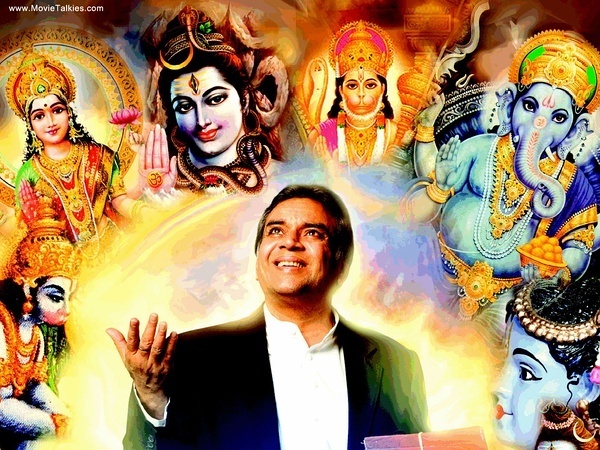Bada Business Paise Se Nahi, Bade Idea Se Bada Hota Hai - Shraddha's take on Financial Lessons to be learnt from Bollywood Comedies

Comedy Bollywood movies are like a communal hug – a “jaadu ki jhappi” as Munnai Bhai says. The primary purpose of these comedy flicks is to entertain us by emotionally involving us and making us burst into laughter. However, often, these movies and their dialogues have also offered a space into reality by giving us valuable insight into finance and money management.
Let us
take a look at financial lessons from these dialogues of the famous comedy
movies:
# 1 - Phir Hera Pheri – 21 Din Me Paisa Double

Raju liquidates all of the trios' assets and invests in one single scheme from ‘Laxmi Chit Fund’. The idea of believing Anuradha wasn’t wrong, but investing all his funds in a single scheme was. For that matter, he also took credit from an outsider to meet these requirements. As a result, not only did he lose the interest he would have received on this money, but also lost the principal and the asset – bungalow. Had Raju manage to retain their bungalow and invest only available funds, he could have atleast diversified the risk.
Lesson: When you think you are ready to play in the investments market, the foremost thing you must remember is to diversify your investment. If you heavily invest in real estate, liquidity may get difficult at the time of an emergency. In contrast, keeping huge amounts of cash with you can be difficult at times of demonetization. You must take up a smart mix of assets from different instruments so that one market crash can be balanced by another market’s hike.
# 2 - Andaaz Apna Apna - Lagta hai kachcha khiladi hai

The whole idea of Teja kidnapping Bajaj was so grossly wrong. Teja dreamt of asking ransom from Raveena for kidnapping Bajaj and then build his own poultry farm! Yes, heard that right – “Bread ka Baadshah aur Omlette Ka Raja”. However, little did he have an idea that Raveena would actually have nothing to offer him. Amar and Prem showed us why we should do proper research before starting any venture in life – “Tumhara Plan Hi Galat Hai. Tumne baap ko kidnap karke beti se paise maange? Tumhe beti ko kidnap karke baap se paise maangne chaiye the”
Lesson: Do not start a venture without proper research. Identifying your
clients and their buying habits is an essential component of starting a new
profession. Aside from knowing your clients, you need to also know what your
fellow professionals offer. Lack of research is one major reason why most of
the start-ups and newly established professions fail in India.
# 3 - OMG – Oh My God – Arre, ye sab kaun padhta hai?

In the early part of the movie, we see how the insurance claim filed by
Kanjibhai for his shop destroyed in a low-intensity earthquake is rejected by
the insurance company. The reason cited by them is that the insurance cover
doesn’t include natural calamities. The branch manager asks Kanjibhai – “Aapne
form sign karte time ye padha nahi tha?” to which the latter reverts – “Arre, ye
sab kaun padhta hai?”
Lesson: The behavior shown here is quite relatable to all of us. We cannot blame the regulators here who always have tried to protect the client’s interest. It is ideally the client’s responsibility to read the documents and application forms in full – be it an insurance proposal, an offer document for an investment, or even loan documents. Again, the accountability lies with the clients in such mishaps, atleast to the extent of reading the contract before signing the financial documents (perhaps any documents). It is never enough to emphasize the importance of reading the legal document and understanding the implications of various clauses, before signing it.
# 4 - Hera Pheri – Sunday ko mast naah dhhoke aa !

We see the trio planning to demand a double ransom amount from Devi Prasad and making their own share of the money by doing Hera Pheri. While the Game (‘KHEL’ as they called in the movie) is yet to be executed and the trio are yet to get the ‘Chappar Phaad Ke Amount’, Baburao has already planned how to spend the money! Yes, he has planned a detailed list of expenditures like Daaru Ka Nal, informing the creditors to come and collect their money next week. But, their lives take a turn when the first time they attempt to execute the whole Khel, they fail at it. Not only are Babu bhaiyya’s dreams shattered, but his creditors are also waiting to get their money back.
Lesson: Do Not Spend Before You Earn. And it’s so easy to do, right? We
whip out the credit card too many times and suddenly we get a bigger balance
than we can pay. A correct balance of Saving, Investing and Spending the
leftover will never let you fail or feel embarrassed in life. Human wants are
insatiable, so don’t expect to satisfy all your wants before you start saving
or investing.
# 5 - Welcome - Control Uday Control
In the movie, we have seen a perfect combination of an impatient and a patient family member. Majnu Bhai was restless and never kept his nerves calm. He never even waited for the correct timing to execute any action. He had this kill or cure attitude and hence, he could never reach the level Uday Bhai could. Whereas, Uday Bhai behaved patiently in all situations and never counted his chickens before they hatched. Remember the “SEH LENGE THODA” attitude?
Lesson: Don’t be impatient. Wait for the correct time. Whether it’s about
selling bonds before maturity or liquidating fixed deposits before the
due date, it could impose a penalty on you. One lesson we should learn is to
invest keeping the tenure in mind from the beginning and not act impatient for
early results.
# 6 - Hungama – Anandilal Katpitya ke saath jo hua, who Radheshyam Tiwari ke saath na ho

This hilarious movie by Priyadarshan Sir takes a turn when Radheshyam
Tiwari decides to settle in Mumbai. We see his legal advisor citing an example
of ‘Anandilal Katpitya’ whose children separate from their family because they
haven’t really moved with time (they still are of old thinking). If this wasn’t
enough, Anandilal Katpitya and his wife are now left on their own terms and have a
financial crisis. To avoid the instance happening with themselves, Radheshyam and
Anjali Tiwari decide to shift Mumbai and adapt to the new milieu.
Lesson: Adapt to Newness and Be Independent in Personal Finance. Whether its personal life or finance, adapting to newness becomes vital. One should always start looking beyond the traditional way of investing and try adapting to the new-fangled ones. This movie also teaches us the importance of being independent of the children in terms of personal finance. Radheshyam, unlike Anandilal Katpitya was living on his own terms and was not dependent on his children to support him financially. There is nothing wrong to expect children to upkeep you financially, but own arrangements should always be covered.
# 7 - Dulhe Raja – Us 5 star me jitney log rehte hai, who khane yaha aate hai
This Govinda movie revolves around a never-ending tiff between a 5-star
owner K.K. Singhania and a roadside Dhaba owner Raja. Multiple times in the
movie we see how Raja regularly manages to get customers to his dhaba by coming
up with various attractive offers. Initially, Singhania doesn’t take his offers
seriously, but eventually, he realizes that the small dhaba owner is turning
out to be a big competitor for him.
Lesson: Never underestimate your competitors. Having a healthy
respect for rivals is one of the key attributes of any champion. Sure, you may
be superlative in your business, but underestimating your competitors merely
because they aren’t as big as you are or they have just started new, won’t help
you. Remember, competition is a fact of life and how will you react to it will
define your success.
# 8 – 3 Idiots – Meri 4 lakh ki ghadi

Amongst the many lighter moments in the movie, there is one where Suhas blasts out on Pia for losing a ‘4 lakh ki ghadi’. He was so brand and price-conscious that he could easily hurt Pia’s emotions over money. As they say ‘The cynic knows the price of everything and the value of nothing’.
Lesson: In life, relations are above money. A trip abroad may cost you in lakhs, but the time spent with closed ones is PRICELESS.
Remember Yashvardhan Raichand in K3G? “Paisa toh har koi kama leta hai,
lekin izzat kamaana sabke bas ki baat nahi” !

Awesome blog! The movies were epic and the connection of scenes to finance is too good. Waiting for the next blog!
ReplyDeleteThanks a lot ! Will try and upload more of these 😇
DeleteVery well written! 👍🏻
ReplyDeleteThanks a lot ! You are inspiring me to write 😇
DeleteAmazing. Never knew learning financial lesson could be so fun.
ReplyDeleteThankyou so much ! 😇
DeleteWell connected..good way of observing and writing
ReplyDeleteThanks for your kind words Dhruvi ! ✌️
DeleteGood analogy and nicely represented.
ReplyDeleteHi, Thankyou so much
DeleteThat's Amazing... Very well explained, each & every scenes are very well connected to finance..
ReplyDeleteThankyou so much ! I guess everything around us teaches us a lesson. It's how exactly we look at it
DeleteVery well correlated movies with the finance. Very well articulated. It doesn't look this is your first blog.
ReplyDeleteThankyou so much ! Have tried to put every effort possible
DeleteAwesome blog , lagta hai yeh race teri (shraddha) hai hai or tu( shraddha ) is race ki purani khiladi hai👌👌👌
ReplyDeleteHahaha ! Thankyou so much !
DeleteLife is a race, if you dont run fast, you would be like a broken anda
Very well written and you have described it so well Sharddha 👏 😘
ReplyDeleteThankyou so very much for your kind words Rafia 😇
DeleteGr8 Work.... Enjoyed reading 👍
ReplyDeleteHi ! Thankyou so much !
DeleteVery well explained...Loved the analogy.
ReplyDeleteThankyou so much
DeleteOMG !! It is so well written, explained and shows a completely new perspective of the movies.
ReplyDeleteOnly you have the talent to shed light in a different angle to the movies 😝
Haha, thanks a lot ! Movies flow in my blood
Delete